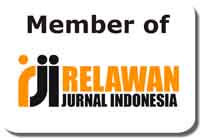The Influence of Greek Philosophy on The Development of Arabic Grammar
Abstract
Keywords
Full Text:
PDFReferences
Abdillah, Z. A. (2003). Pro-Kontra Pengaruh Filsafat Terhadap Nahwu. Adabiyyat, 1(2), 1–23.
Adamson, P., & Taylor, R. C. (2005). The Cambridge Companion to Arabic Philosophy. Cambridge: Cambridge University Press.
Afandi, Z. (2009). Ibnu Jinni Menembus Sekat Mazhab Linguistik Memadukan Aspek Logis dan Sosiologis. Adabiyyat, 8(1), 49–76.
Ahmed, Z. (2008). Essentials of Arabic Grammar for Learning Quranic Language. (M. Irshad, Ed.). Pakistan: DARUSSALAM. Retrieved from www.sautulquran.org
Al-’Akili, H. M. H. (2014). al-Fikr al-Nahwy fi Dhaw’i al-Manthiq al-Aristhy. Jayl Al-Dirasat Al-Adabiyyah Wa Al-Fikriyyah, 4(2), 23–35.
al-Fadhliy, A. H. (1986). Marakiz al-Dirasat al-Nahwiyyah. Yordania: Maktabah al-Mannar.
Al-Farahidi, al-K. bin A. (2002). Kitab al-’Aiyn. Beirut: Dar al-Kutub al-’Ilmiyyah.
al-Jabri, M. A. (2009). Takwin al-’Aql al-’Araby. Beirut: Dar al-Thali’ah.
Al-Qurthubi, I. M. (1983). al-Radd ’Ala al-Nuhat. (S. Dhayf, Ed.). Kairo: Dar al-Ma’arif.
Al-Rajihi, ’Abduh. (1979). al-Nahw al-’Araby wa al-Dars al-Hadits: Bahts fi al-Manhaj. Beirut: Dar al-Nahdhat al-’Arabiyyah.
Al-Suhayli, A. al-Q. ’Abdurrahman bin ’Abdillah. (1992). Nataij al-Fikr fi al-Nahw. (’Adil Ahmad ’Abd al-Mawjud, Ed.). Beirut: Dar al-Kutub al-’Ilmiyyah.
al-Thanthawy, A. (1999). Nasy’ah al-Nahw wa Tarikh Asyhar al-Nuhat. Kairo: Dar al-Ma’arif.
Ardinal, E. (STAIN K. (2013). Pemikiran Syauqi Dhaif dan Upaya Pembaharuannya di Bidang Pengajaran Nahwu Telaah Buku Tajdid al-Nahwi Karya Syauqi Dhaif. Jurnal Islamika, 13(2), 177–190.
Arummi, A. (2015). Ibnu Madha dan Revolusi Nahwu Ala Madzhab Andalusia. CMES, VIII(1), 91–100.
Asrina. (2016). Khilafiyah Nahwiyyah: Dialektika Pemikiran Nahu Basrah dan Kufah dalam Catatan Ibn al-Anbâri. MIQOT, XL(2), 410–430.
Back, A. (2008). Islamic Logic. (S. Rahman, Ed.). Retrieved from https://books.google.com/books?id=HdaBzXaD3ZIC
Barbosa, M. F. M. (2015). A Brief way on Philosophy of Language : from Plato to Port-Royal Grammar. International Journal of Language and Literature, 3(1), 61–70. https://doi.org/10.15640/ijll.v3n1a8
Bloomfield, L. (2010). An Introduction to The Study of Language. New York: Henry Holt and Company.
Boer, T. . De. (1993). History of Philosophy in Islam. (E. D. Jones, Ed.). London: Luzac.
Chaqoqo, S. G. N. (2015). Sejarah Nahwu Memotret Kodifikasi Nahwu Sibawiyh. (M. Hasbi, Ed.). Sala: LP2M-Press IAIN Salatiga.
Corazzon, R. (2018). The Rediscovery of the Corpus Aristotellicum and the Birth of Aristotellianism. Theory and History of Ontology, 27(3), 41–51.
Darwiysh, A. (1987). Dirasat fi ’Ilm al-Sharf. Kairo: Maktabah al-Thalib al-Jami’ah.
Dhayf, S. (2013). Tajdid al-Nahw. Kairo: Dar al-Ma’arif.
Dihe, B. (2018). Konstruksi Pemikiran Sibawaih dalam Kajian Ilmu Nahwu. Rausyan Fikr, 14(1), 89–111.
Duan, S. (2017). Bloomfield’s Concept of Meaning. Journal of Language Teaching and Research, 8(2), 343–348. https://doi.org/http://dx.doi.org/10.17507/jltr.0802.17
Hafid, K. (2016). Relevansi Kaidah Bahasa Arab dalam Memahami Alquran. Tafsere, 4(2), 193–205.
Hussein, B. A.-S. (2012). The Sapir-Whorf Hypothesis Today. Theory and Practice in Language Studies, 2(3), 642–646. https://doi.org/10.4304/tpls.2.3.642-646
Khalf, A. ’Ali S. (2011). Nazhriyah al-Nahw al-’Araby wa manahij al-Dars al-Lughawi al-Hadits.
Khaqani, M. (2004). al-Khalil bin Ahmad al-Farahidi fi Mizan al-’Aqliyyah al-Farisiyyah. Majallah Al-’Ulum Al-Insaniyyah, 11(2), 21–32.
Lewis, B. (2002). The Arabs in History. Oxford: Oxford University Press.
Ma’n, M. ’Abbad. (2001). al-Mu’jam al-Mufashshal fi Fiqh al-Lughah. Beirut: Dar al-Kutub al-’Ilmiyyah.
Madkur, I. (2000). fi al-Falsafah al-Islamiyyah. Kairo: Dar al-Ma’arif.
Malink, M. (2015). The Beginnings of Formal Logic: Deduction in Aristotle’s Topics vs. Prior Analytics. Phronesis (Vol. 60). https://doi.org/10.1163/15685284-12341286
Mckeon, M. (2004). Review of “Tractatus Logico-Philosophicus .” A Biannual Journal, 5(1), 1–6.
Moss, S. (2012). The role of linguistics in the philosophy of language. Routledge Companion to the Philosophy of Language, 1–17. Retrieved from http://www-personal.umich.edu/~ssmoss/moss the role of linguistics in the philosophy of language june 2012.pdf
Muhammad, S. A. B. S. (2016). al-Manthiq wa al-Lughah wa Shilatuhuma bi ’Ilm Ushul al-Fiqh. Global Libyan Journal, 5(1), 1–26.
Mukrim, A. ’Al S. (1989). Jalaluddin al-Suyuthi wa Atsaruhu fi al-Dirasat al-Lughawiyyah. Kairo: Dar al-Fikr.
Mumtahen, M. (2015). al-Nahw wa Hikayah Nasy’atuh. Turats Al-Adaby, 4(1), 69–74. https://doi.org/10.1007/978-4-431-55690-9_13
Nur, M. (2011). Islam dan Logika Menurut Pemikiran Abu Hamid al-Ghazali. Jurnal Al-Ulum, 11(3), 47–62.
Pribadi, M. (2017). Sumbangan al-Khalil dalam Perkembangan Nahwu Arab. Adabiyyat: Jurnal Bahasa Dan Sastra, I(1), 73–93.
Qaddarah, F. S. S. (1983). Masail Khilafiyyah Bayn al-Khalil Wa Siybwaih. Kairo: al-Hay’ah al-Mishriyah al-‘Ammah li al-Kitab.
Rahman, A. A. (2010). Sejarah Ilmu Nahwu dan Perkembangannya. Ada, X(35), 98–109.
Ritonga, M. (2016). Bargaining Kata di Dalam Al Qur’an : Kontroversi Ahli Terhadap Bahasa al Qur’an. Akademika, 21(2), 229–254. Retrieved from http://e-journal.metrouniv.ac.id/index.php/akademika/article/view/466
Rosyidah, I. (2011). Ideologi Madzhab Fiqih dan Sosial Politik dalam Kaidah Nahwu (Ibnu Madha dalam ar Rad ala al Nuhat). ULUL ALBAB Jurnal Studi Islam, 12(2), 197–218. Retrieved from http://ejournal.uin-malang.ac.id/index.php/ululalbab/article/view/2390
Ryding, K. C. (2005). Modern Standard Arabic. Cambridge: Cambridge University Press.
Saehudin, A. (2014). Originalitas Pemikiran Fonetik al-Khalil Ibn Ahmad al-Farahidi. Alfaz, 2(2), 200–222.
Safa, N. H. A. (2008). Perbandingan Metode Nahwu Al-al-Akhfash dan al-Farra’ dalam Kitab Ma’ani Alquran. Bahasa Dan Seni, 36(2), 139–149.
Saussure, F. de. (1974). Course in General Linguistics (Vol. 9). New York: McGraw-Hill Book Company. https://doi.org/10.1037/0021-9010.60.6.742
Schock, C. (2015). Name (ism), Derived Name (ism mushtaqq) and Description (wasf) in Arabic Grammar. In Muslim Dialectical Theology and Arabic Logic (pp. 329–360). Cambridge: Cambridge University Press.
Schwartz, D. J. (2007). The Magic of Thinking Big. New York: Fireside.
Setiawan, J., & Sudrajat, A. (2018). Pemikiran Postmodernisme dan Pandangannya Terhadap Ilmu Pengetahuan. Jurnal Filsafat, 28(1), 25–46. https://doi.org/10.22146/jf.33296
Shah, M. (2005). The Quest for the Origins of the qurrāʾ in the Classical Islamic Tradition. Journal of Qurʾanic Studies, 7(2), 200.
Soames, S. (2010). Philosophy of Language. Oxford: Princeton University Press.
Syahin, ’Abdushshabur. (1993). fi “Ilm al-Lughah al-”Amm. Beirut: Muassasah al-Risalah.
Syamsuri. (2011). Pengantar Qawa’id al-Tafsir. Sulesana, 6(2), 91–97.
Troyer, G. van. (1994). Linguistic Determinism and Mutability: The Sapir-Whorf “Hypothesis” and Intercultural Communication. JALT Journal, 16(2), 163–178. https://doi.org/10.1016/j.asr.2005.10.026
Utsma bin Qanbar, A. B. ’Umar. (1988). al-Kitab: Kitab Siybawaiyh. (A. M. Harun, Ed.). Kairo: Maktabah al-Khaniji.
Wahab, M. A. (2014). Kontroversi di Seputar Otensitas Nahwu. Retrieved from http://repository.uinjkt.ac.id/dspace/handle/123456789/33920
Wanis, ’Ali. (2006). Mabadi ’Ilm al-Manthiq. Beirut: Dar al-’Ilmi wa al-Tsaqafah.
Wittgenstein, L. (2015). Tractatus Logic-Philosophicus (German). London: Kegan Paul.
Ya’qub, S. H. (1986). Mawqif al-Nuhat Min Falsafah al-Nahw. Malaysia: Islamic Universit Malaysia.
Yaacob, S. (2013). Linguistic Argumentation and Logic: An Alternative Method Approach in Arabic Grammar. Argument, 3(2), 405–427.
Yaacob, S. (2014). The Conflict of Theory in Arabic Grammar. International Journal of Social Science and Humanity (IJSSH), 4(1), 1–4. https://doi.org/10.7763/IJSSH.2014.V4.308
Zaid, N. H. A. (1994). Naqd al-Khitab al-Dini. Kairo: Shina li Nasyr.
DOI: http://dx.doi.org/10.31332/lkw.v5i1.1135
Copyright (c) 2019 Mahyudin Ritonga

This work is licensed under a Creative Commons Attribution-ShareAlike 4.0 International License.
Publisher:
UPT Pengembangan Bahasa, IAIN Kendari
Jln. Sultan Qaimuddin No. 17 Baruga, Kota Kendari, Sulawesi Tenggara
Website: upb.iainkendari.ac.id
Email: [email protected]



















